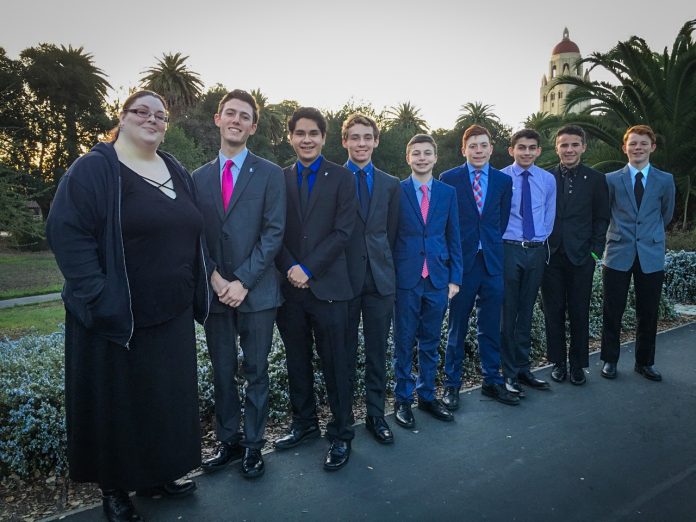The Servite Speech & Debate Team journeyed to Palo Alto last weekend for the Stanford Invitational Tournament. Eight debaters competed in two events, Congress and Lincoln-Douglas. Congress debaters showed perseverance and knowledge of current political topics by each competing in three 3-hour long rounds. After competing, they enjoyed a sightseeing trip to San Francisco. Senior Patrick Aimone took 2nd place in Lincoln-Douglas, earning his third bid to the TOC National Championship. He will compete in Kentucky in May, and is currently ranked 26th in the nation for LD. Congrats to the entire team and Coach Sarah Sherwood for a great travel tournament!
Patrick Aimone shared about the experience in an interview with John Overing:
Question: You entered finals with 18 ballots won. How did you feel? Were you calm and prepared, on-edge and energetic?
Patrick Aimone: Thanks for the count! I was feeling fairly calm through Monday morning, and I think a lot of that came from feeling comfortable and prepared with the positions I was reading. By late elims, it became much more important to feel comfortable and confident in my strategy than to cut new positions or responses, and I think that really helped with my state of mind at the tournament.
Q: As a philosophically-oriented debater, what positions did you debate the most?PA: Well, you’re not wrong, and I would say most people engage with either util/epistemic modesty type arguments or some sort of K of the epistemology of the philosopher in question (although occasionally you get a phil vs phil debate, which are definitely my favorite). In general, I find the best way to approach these arguments is to win the substantive truth of your philosophy, and then evaluate how the impacts those “higher-layer” arguments function (or don’t) under your framework..
Q: Did you have any phil vs phil rounds this past weekend? Why might these rounds be less common?
PA: I did have some phil vs phil rounds this weekend, apart from the obligatory util debates, so thanks to Los Osos, Strake, Oakwood, and Harvard-Westlake (!) for those. In SoCal, at least, phil debate seems to be declining at least in part due to the fluid interchange between LD and policy in both the competitor and judge pool– nothing wrong with that, of course, but you certainly do have fewer rounds where all three participants are inclined towards that style of debate.
Q: How do you adapt your style, then? I imagine it’s hard to convince a policy judge to vote on Kant!
PA: While I’m probably not a paragon of adaptation by any means, it’s definitely true that for many judges, the presentation of your argument matters more than its content. With that in mind, CX, 2NR/AR overviews, and solid analogies are all especially potent tools to convince judges who might write off “phil debate” in the abstract that your particular position is reasonable and comprehensible.
And in some ways, convincing a policy judge to vote on a position with which they’re not initially familiar can be easier than winning with a position in which you’re not personally confident.
Q: I definitely agree. Any closing comments, thank-yous, or shout-outs?
PA: Some things that made this tournament enjoyable for me were: everyone who asked for a slow round in front of Jackson Lallas, answering disclosure theory, having the entire Servite Congress team show up to observe a LD round, and debating my erstwhile VBI roommate in finals.
PA: Also, I didn’t realize until before finals that this was my last regular season LD tournament, and I’m really thankful for the friends and community I’ve gotten to share the last four years with. While LD isn’t perfect, debate as an intellectual exercise is made better by the friendships that we form with our competitors, and hopefully that aspect of the community only continues to grow.
(http://www.premierdebate.com/2018-stanford-finalist-interviews)
For more information regarding Servite’s Speech and Debate visit our website.













